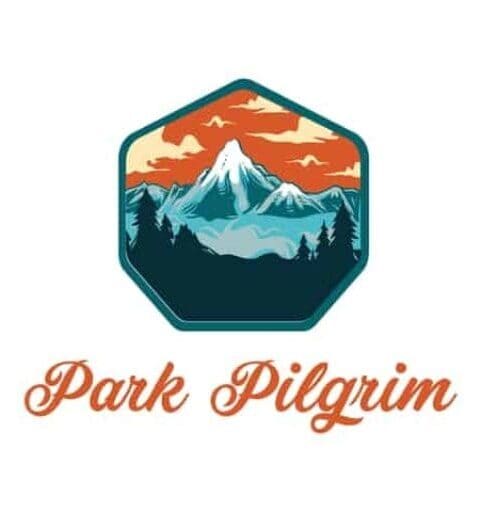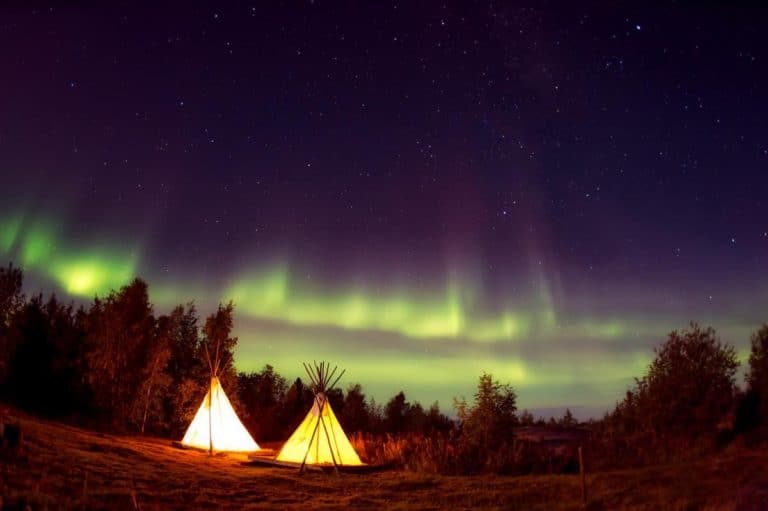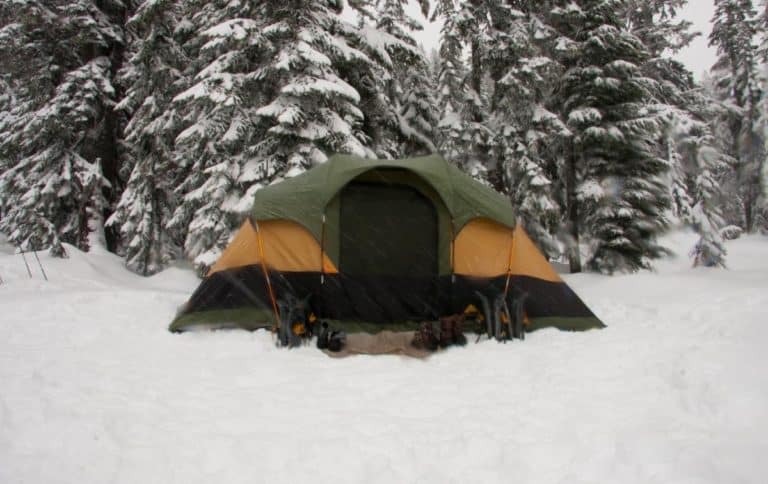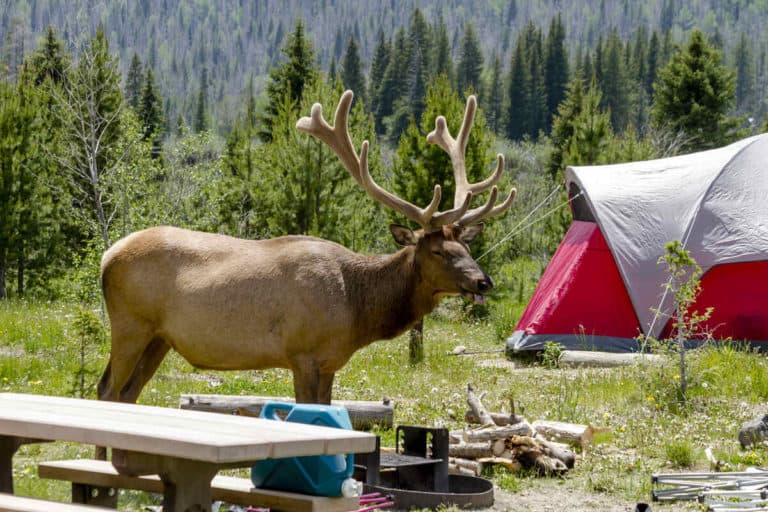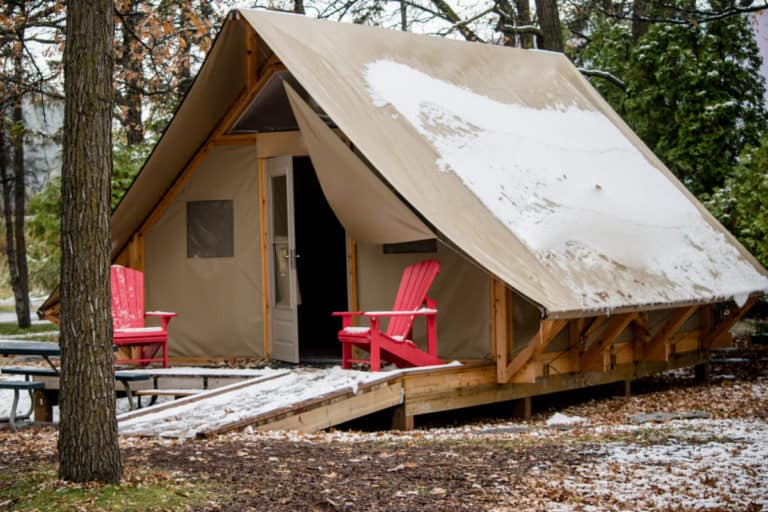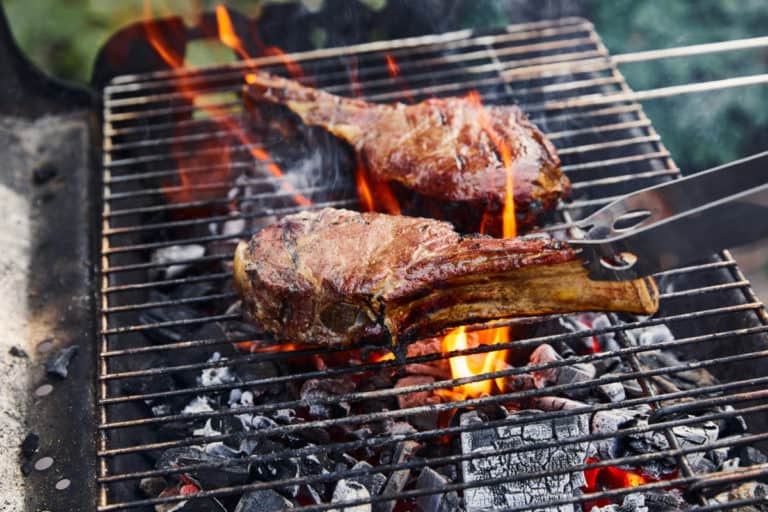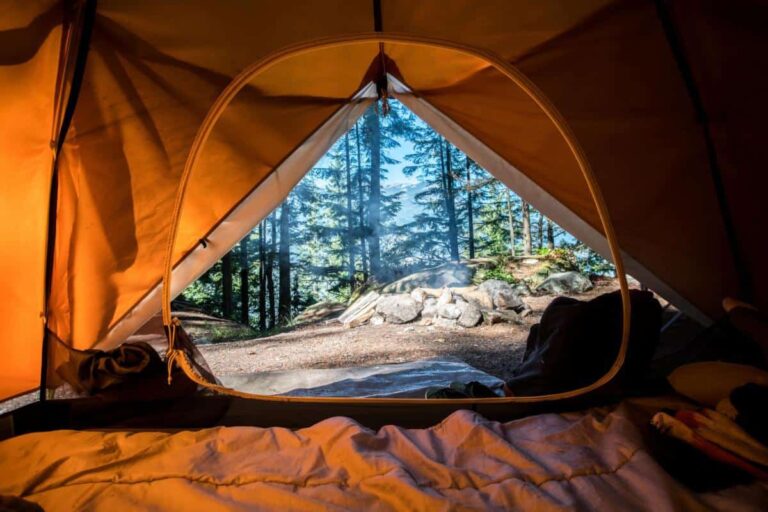Everything You Need to Know About Camping in the Rockies
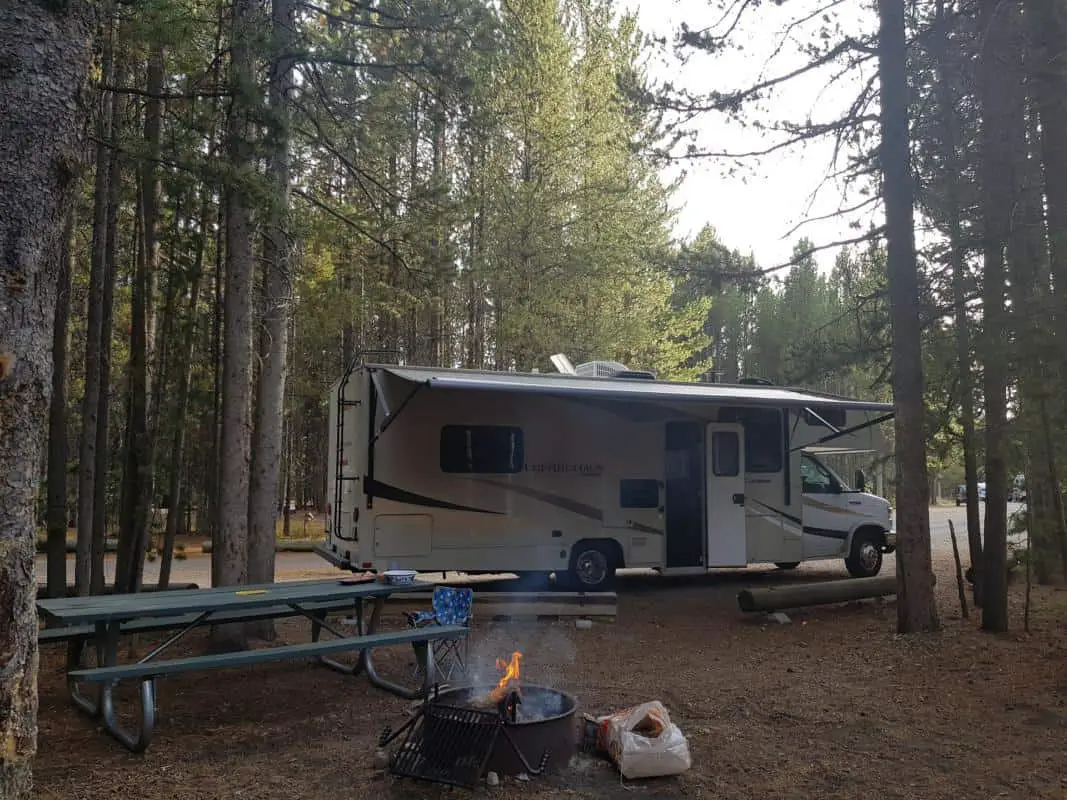
If you want to go camping in the wilderness of the Rocky Mountains, several things are good to know, whether you go on an adventure with your RV or as a backpacker.
If you’re interested in camping in the wilderness, you probably know the book Into The Wild by Jon Krakauer. Or the movie of the same name, directed by Sean Penn (if you don’t, here you will find the book and here you will find the movie; both highly recommended).
This true story about American twenty-something Christopher McCandless shows that you should prepare your stay in the wilderness. Sure, it doesn’t have to be as extreme as in McCandless’ case (surviving in the Alaskan wilderness in winter).
I wouldn’t recommend it either, by the way. But it’s obviously helpful to get a good idea of what camping in the mountains entails.
So this post is not necessarily for the seasoned camper. But if you would like to go on an adventure in the Rockies and you haven’t done so before, or have little experience with it, then read on.
Also, if you would like to find out where you can camp in Banff National Park, this post about campgrounds in Banff National Park is a good source.
Advantages of Camping at an RV site
Let’s start with the nice things about camping in the wilderness. On a campground, that is. Sure, spending your time at such a campground is primarily practical. After all, you have to spend the night somewhere. And it’s nice to be able to shower, make a fire or charge your smartphone. But there are also other benefits of camping at a campground.
1. Peace and Quiet
This one is obvious, but that doesn’t make it any less true. No traffic jams, no city noises around you and a little more time for yourself and for the moment. Works great for reflecting on the fantastic trip you’re on.
2. Sleep Better
Camping helps you get better sleep. This has everything to do with melatonin and the natural light outdoors. Melatonin is a natural hormone that regulates your sleep and wake cycles. If you work in artificial light for too long, you may experience suppressed melatonin levels. This is due to the blue light in artificial light sources such as light bulbs.
On the other hand, camping outdoors exposes you to melatonin-friendly yellow light. This can help you achieve a more natural alignment of the sleep-wake cycle with sunrise and sunset.
3. Less Stress
This one may also be obvious, but that doesn’t make it less important: camping reduces stress. No daily worries on your mind. Not the daily rush at work and all those who want something from you. No daily traffic jams on the way to work or the noise of city life. Instead, the subtle sounds of wind blowing through the trees and birdsong.
4. Closer to Nature
At this point, you may think: well, quite obvious! But still, it must be mentioned, because it is worth a lot. You have to go out on the weekend to enjoy nature in your daily life. Or worse, you’re so busy you never get around to it. The overwhelming nature and views are omnipresent when traveling through the Rockies, even at your campground.
5. More Physical Activity
Camping requires more physical activity to go about your daily life. You walk a lot more on a campground, even for going to the toilet or cooking in the camp kitchen. Or maybe you catch your own fish to cook at the campground.
6. Better Relationships
You don’t have cell phone or tablet coverage everywhere (not in most places), so they also don’t distract you constantly. And that makes you rely more on your companions and/or family members.
As a result, you talk to each other more, and because you’re in a forest and breathe fresh air, your body releases higher levels of serotonin. That’s a naturally produced neurotransmitter that helps you regulate your mood, appetite and sleep, among other things.
7. Extra Shot of Vitamin D
In the outdoors, your body absorbs large amounts of sunlight. The sun provides a healthy tan, and your body uses it to make vitamin D. That vitamin helps your body absorb calcium and phosphorus.
8. Better Memory
When you camp, your body releases higher serotonin levels due to your prolonged stay in the outdoors. Among other things, serotonin improves cognitive functions such as memory and learning.
9. Affordability
Of an entirely different order than the previous eight points, affordability is undoubtedly an essential benefit for many visitors to the already expensive park.
Of course, you shouldn’t compare a hotel stay with a night in your RV or tent, but I’ll do it here anyway. Because the price differences are enormous. For a night in a hotel in Banff or Lake Louise, you pay well over CAD 200 per night in high season, while on most campgrounds, you can stay for less than CAD 30.
Disadvantages of Camping on a Campground
Of course there are also downsides to camping on a campground. They are good to think about before taking out your RV or tent.
1. Insects (Insect Bites)
Undoubtedly disadvantage and annoyance number one: insects. And especially insects that sting. In the Rockies, they are unfortunately present in large numbers. And especially mosquitoes. The water in the Rockies is teeming with mosquitoes and other insects. Make sure you have a good mosquito repellent with you. Because waking up in the morning with dozens of mosquito bites is obviously no fun.
2. Bad Weather (too Cold, too Hot or too Rainy)
The weather in the Rockies can be fickle. It can get pretty cold at night, even in the middle of summer. Don’t be surprised to see it snowing in July or August. Be prepared and make sure you have warm clothing with you.
3. Noisy Insects, Animals and People at Night
Not only do you have to deal with insects because some of them will sting you, causing an unpleasant itch, they also produce annoying sounds. Especially if you spend the night in a tent on a campground, you hear everything. Not to mention the irritating buzzing of a mosquito near your ear when you sleep.
Of course you also have to deal with your fellow campers. Some of them have just a bit too much fun and make noise until the middle of the night when you want to sleep. Especially if you spend the night in a tent, this can be a nuisance, but even inside RVs you can hear outside noises quite easily.
4. Sharing a Bathroom with Other Campers
One of the most common annoyances of campgrounds is sharing your shower with others. This usually does not mean the best hygiene, you feel less comfortable, and if you’re unlucky, you have to wait a while before you can actually take a shower.
5. No Internet
It may be a blessing for some, but no internet connection is a reality that is hard to swallow for many people. In the Rockies, you have no coverage and no internet in most places.
6. Sunburn
You are likely to get sunburnt. Because as a camper, you spend almost the entire day in the sunlight. At the time it happens, you don’t notice it that much. But during the night in your tent or camper, your body starts glowing, and in some places, it is downright painful. If you’re not careful, you have to see a doctor. I know what I am talking about…
7. Getting Bored Quickly
As beautiful as the Rockies are, at some point, you know your surroundings, you’re tired of hiking, you’ve cooked, showered and want to relax. There is no internet, so there’s not much choice but to talk together. If that doesn’t help, boredom is lurking. Bring a book or something else with which you can amuse yourself. Otherwise, boredom can become a nasty disease during your stay.
8. Getting Dirty Quickly
Yes, this is also part of staying at a campground: getting dirty quickly. If not from the burnt wood of the campfire, or the smoke that gets into your clothes, you get dirty from the sand and dust on your camping spot. In short: Those who camp should not mind not always looking fresh as a daisy.
9. Limited Supply of Food
One of the most pleasant pleasures of life: food. But unfortunately, if you’re staying at a campground, the nearest supermarket is often more (much) than ten kilometers (6.17 mi) away. So you can’t just quickly grab some chips or extra meat for your barbecue. So make sure you have enough food with you, so you don’t have to go to sleep feeling starved.
TIP: If, on second thought, you think camping in the Rockies is not for you, read my post with all the ins and outs about alternative ways to spend the night in the wilderness. Maybe it’s just what you’re looking for.

What About Bears at a Campground?
If you are going to spend the night at a campground, you may have to deal with bears. After all, you’re in bear country. The good news: Bears avoid people. The bad news: Confrontations between bears and humans can occur, even at campgrounds. Though they don’t happen very often.
Campgrounds usually have many people present, so bears usually stay away from them. Though when you’re staying at a backcountry campground, you’re more likely to encounter a bear at the campground.
Both campgrounds follow the same rules to minimize the chances of a bear encounter. The guidelines below are especially applicable if you’re staying at a backcountry campground:
- Camp in designated areas, if available
- Maintain good visibility so that you will notice a bear when it gets onto the campground
- Do not sleep in the open but in your tent
- If you are camping at a random site, cook and eat at least fifty feet away from your tent
- Do not store food, pet food, or trash near your tent. Storage facilities are often available. If not, you can hang it on a line between two trees. Ensure your gear is hung at least 4 meters (13 feet) above the ground and 1.5 meters (5 feet) away from both trees. Also, store toiletries and your personal belongings here.
- Avoid camping, cooking or eating near running water, dense brush, animal tracks and berry bushes
- Avoid messy places and areas with bear tracks: bear tracks, trampled bushes, droppings, dismembered logs and claw marks on trees
- Keep your tent, sleeping bag and clothing free of food, food smells (after a barbecue, for example) or drinks
- Always take a flashlight with you if you have to leave your tent at night to pee, for example, and be extra alert
- Pack up your waste and throw it away in a proper place, do not burn it
- Do your dishes immediately after dinner and put them away afterward. Throw food scraps in the [suds] with the garbage. Dump your dishwater in designated areas. Do so downwind and at least 50 meters (165 feet) from your tent
As we’re talking animals, I’d like to advise you to also read the post How to Make Sure Mosquites Don’t Ruin Your Stay in Banff. The tips found here can significantly enhance your camping experience.
Camping Etiquette, Does it Exist?
With just under 100 million (!) families in the United States alone who enjoy camping, it should come as no surprise that not every camper in North America follows the same customs and camping etiquette.
If you want to know what is customary at a campground, read the dos and don’ts of camping at a North American campground below.
1. Rules
Respect the rules of the campground. If campfires are allowed, make sure you have a permit. These are usually available on site.
2. Keep Your Site Clean
Even though you are in the wilderness and there is dust and sand everywhere, it is essential to keep your site clean. So throw away your trash in the designated bins. Are they full? Then please take your trash with you and don’t just leave it anywhere.
3. Respect Your Neighbors
It looks so tempting, crossing the terrain of your fellow campers, a shortcut on your way to the toilet or the storage lockers. Still, it is advised to respect everyone’s privacy and stay on paved roads and paths. It’s also helpful to explain this to your young children.
4. Keep Your Cool in Time
A good relationship with your temporary neighbors is not unimportant to make your stay at the campground as pleasant as possible. If the rules of your campground say it must be quiet at 10 pm, your neighbors will appreciate it if you stick to it. Even if you have no intention of going to bed. That means turn off your radio and your generator. If you are allowed to use a generator at all. Those things make so much noise that they are not permitted on some campgrounds.
5. Don’t Make too Much Noise
Following on from the previous etiquette: don’t make too much noise. No matter how much you love Justin Bieber or Lady Gaga, having their latest hit blasting through your radio across the campground isn’t pleasant for everyone.
6. Don’t Arrive Late to Your Campground and Don’t Leave too Early
If possible, arrive at your campsite before dark to install yourself. Preferably don’t pack up and leave before 7 am Although there may be times when you have no other choice of course. And if you have to set up or break up your tent in the dark, try to keep noise and light to a minimum.
7. Don’t Feed Wild Animals
Your camping spot is not only your (temporary) home but also that of wildlife in the area. So don’t be surprised if you see a moose, elk or bear nearby. Do not feed them or throw food in their direction, whatever animal it is. They will associate people with food and develop problematic behavior if you do. This often leads to the culling of the animal.
As an Amazon Associate ParkPilgrim.com earns from qualifying purchases.
